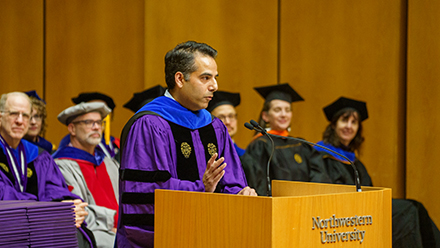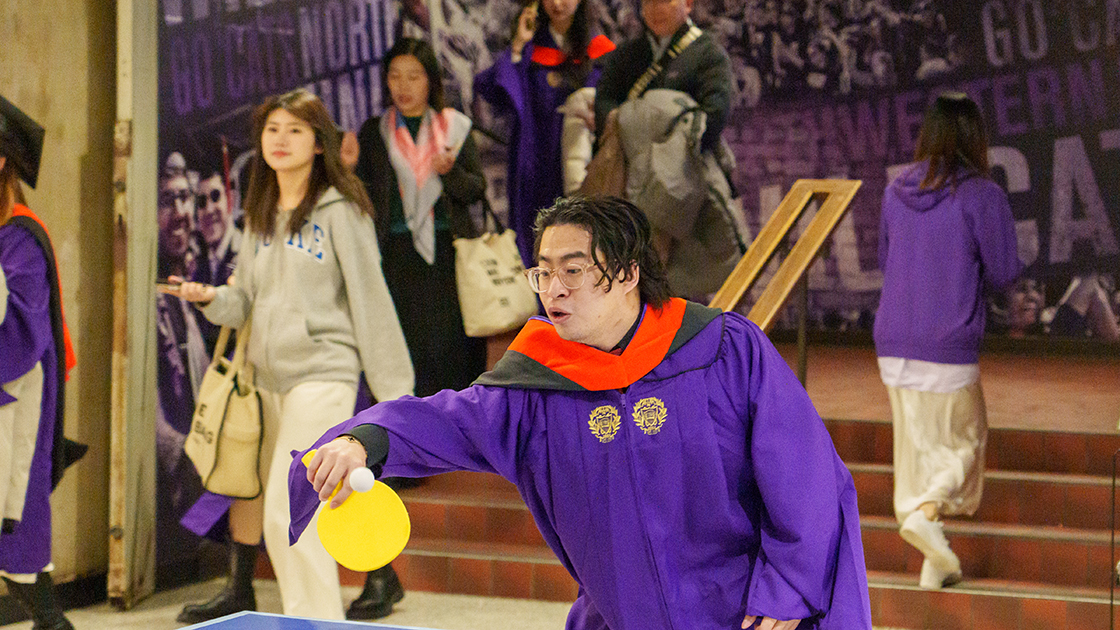Sanjay Sood Shares Leadership Lessons and Life Insights with Graduates
Sood spoke at the December 14 PhD Hooding and Master’s Degree Recognition Ceremony

Sanjay Sood (’02, PhD ’07) turned an early interest in STEM to a lasting connection to Northwestern University.
Sood graduated from Northwestern with bachelor’s degrees in computer science and communication studies and a PhD in computer science. As senior vice president and chief technology officer at CDW, Sood helps shape the global technology and services provider’s future vision and strategic direction while building and implementing platforms that support customers, coworkers, and partners.
During his graduate studies, he met his future wife, Sara, now Chookaszian Family Teaching Professor at Northwestern Engineering. Today, he advises the MBAi program, a joint degree between the McCormick School of Engineering and the Kellogg School of Management that blends business and technology training.

“As you can imagine, we have deep ties to Northwestern,” Sood said. “We have a lot to be thankful for [regarding] our relationships with and from this amazing institution.”
Sood spoke at the 2024 PhD Hooding and Master’s Degree Recognition Ceremony, held December 14 at Pick-Staiger Concert Hall. Sood was introduced by Christopher Schuh, dean of the McCormick School of Engineering.
Schuh, who earned his PhD in materials science and engineering from Northwestern in 2001, knows the value of an education from the University. During his remarks, Schuh recognized graduates as engineering leaders who honed and demonstrated their leadership skills, led innovative research, served as role models and mentors to fellow graduate students, and worked with colleagues across departments and schools to understand how to solve problems and motivate people to adopt those solutions.
“You positioned yourself at the cutting-edge of knowledge and equipped yourself with the tools to stay there,” Schuh said. “And finally, you built a network of colleagues to support you and collaborate with you in maximizing your impact on the world.”
Sood is an example of that impact. He loves his job and the problems he gets to solve, but he did not expect this career path when he graduated from Northwestern.
To reach this point, Sood has internalized three key lessons, which he shared with the Class of 2024.
Communication in science and technology is crucial
Storytelling is often regarded as an art form. While there are countless books on effective communication and storytelling, the practice often comes down to fostering human connection.
During his time at Northwestern, Sood learned this from Kris Hammond, Bill and Cathy Osborn Professor of Computer Science, who served as his PhD adviser. While Sood and his classmates were expected to deeply understand the technical aspects of the systems they built, they were equally encouraged to communicate their innovations in an accessible and engaging way.
“It wasn’t just about using analogies and metaphors to make the complex understandable, it was about knowing your audience and finding ways to draw them into caring about the problems we were solving,” Sood said. “When people can relate to and understand the problem and solution, you inevitably get more support, excitement, and collaboration from those around you.”
For many in the sciences, storytelling and effective communication don’t always come naturally and are often overshadowed by the technical work itself. According to Sood, however, those most successful at balancing technical rigor and “soft skills” — which Sood described as power skills — can make their audience understand and feel invested in the journey.
“I’ll tell you from experience that the nervousness of speaking in front of a group never goes away, but it becomes much easier with time and practice,” Sood said. “Like all things, storytelling is a muscle that can be developed. So, get involved in your community to have a voice, ask to lead a meeting, or even give a toast at your holiday dinner. Make it a part of your routine to practice and get better.”

Get comfortable with being uncomfortable
Sood’s journey has taken him from roles developing “frictionless information systems” in a research lab to working at a Silicon Valley startup automating newsrooms to creating platforms at AT&T to connect people with local businesses, and then designing next-generation maps for self-driving cars. Along the way, he moved several times, got married, started a family, and faced countless forks in the road that required significant decisions.
Sometimes, he took the safe route, such as choosing not to move to Europe during the COVID-19 pandemic. Other times he embraced risk, such as moving to Los Angeles without a network or family. The right choice depends on who you are and your circumstances, Sood said, but each path brings new opportunities while closing others.
“What remains important is always keeping a growth mindset — that is, always looking at challenges, change, and the unknown to improve yourself and your skills,” Sood said. “When you feel stuck at your fork in the road, sometimes it’s better to take a path to just go forward versus getting stuck in the indecision.”
He added that even in senior roles, imposter syndrome is real, but stepping into the unknown is essential for personal and professional growth.
“Fears of failure or letting your team down don’t ever really go away, but these self-doubts can be turned into rocket fuel to drive your mastery and desire to learn a new industry or domain,” Sood said. “I’ve been able to work in so many innovative companies and industries because I’ve embraced the chaos of change and become very comfortable being uncomfortable.”


Savor the experience and connections forged during your journey
During his speech, Sood quoted author Brandon Sanderson and Ferris Bueller. One is an author, the other a fictional character. Yet both have related — and poignant — messages.
“‘Life before death, strength before weakness, and journey before destination’ — or in more colloquial terms, we can look to a fellow Chicagoan Ferris Bueller when he iconically said: ‘Life moves pretty fast. If you don't stop and look around once in a while, you could miss it,’” Sood recited.
Reflecting on his time at Northwestern, Sood appreciates the significance of cherishing every moment and the forks in the road. He encouraged graduates to take a moment to pause, look around, and appreciate the loved ones who’ve supported them.
“My kids are growing fast, with my oldest heading to [college] in a few short years,” Sood said. “I’ve always tried, and sometimes failed, at keeping that balance between my professional and personal lives — they can’t be put into separate silos, as some would suggest, and what happens at work will absolutely impact your life at home and vice versa.”
To help manage the demands of a career and maximize their journey, Sood encouraged the graduates to take time to disconnect and recharge so they may tackle challenges with fresh perspective. By maintaining balance and caring for their own health, Sood said, graduates will be equipped to meet life’s challenges and make the most of its opportunities.
“You all will be the authors and storytellers of the next chapters in our world and with that comes great responsibility and opportunity,” Sood said. “Stay focused, fearless, balanced, and treat those you interact [with] with kindness and empathy.”





